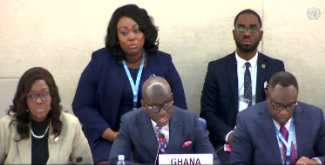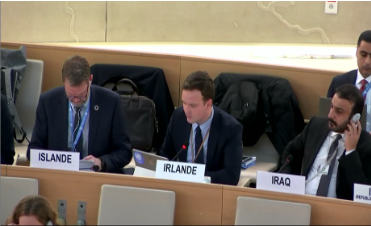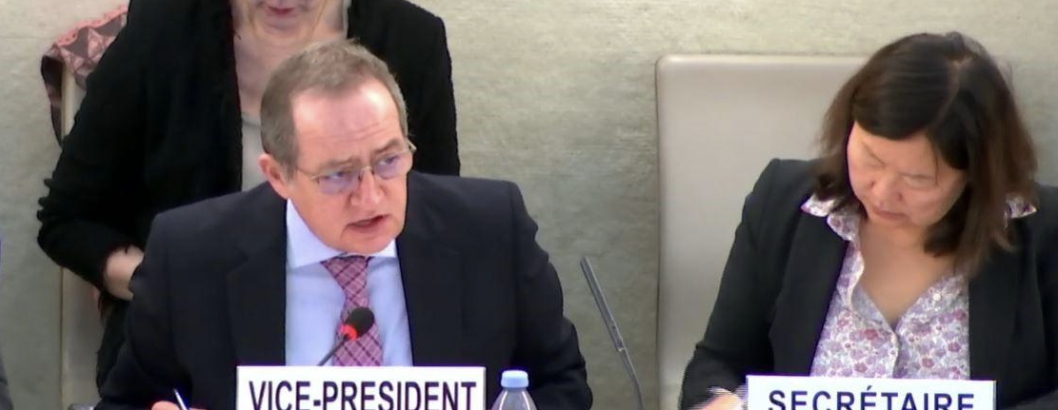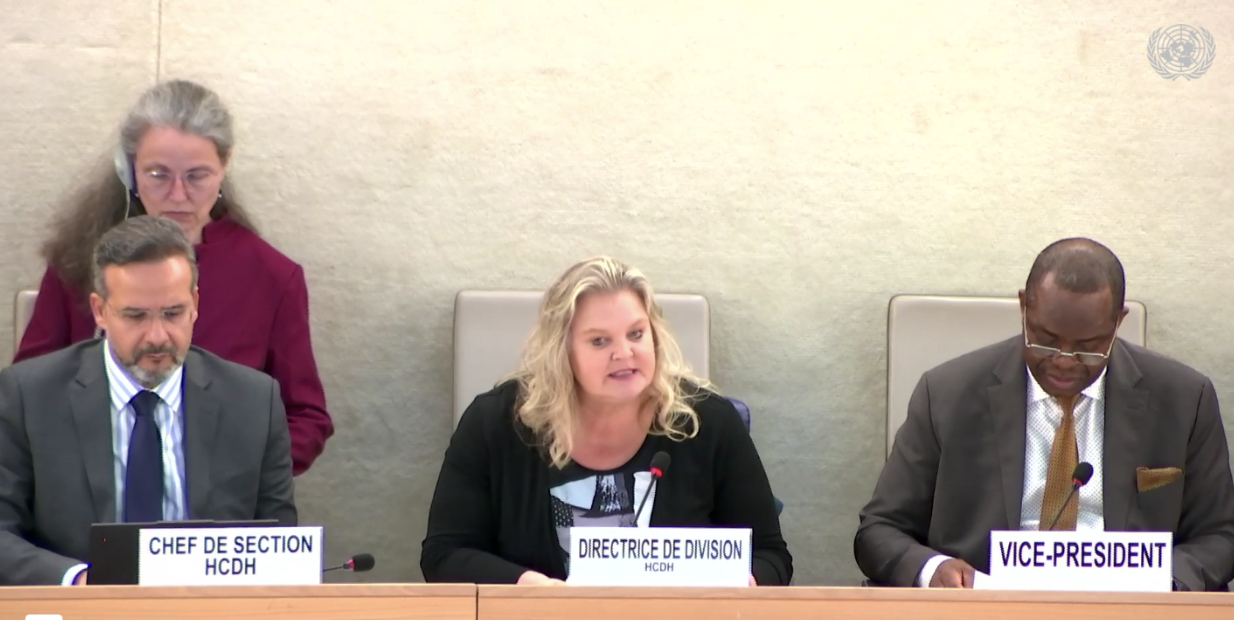By Bethany Morley / GICJ
Executive Summary
On the 24th of January 2023, during the 42nd session of the Universal Periodic Review (UPR), the Human Rights Council held an interactive dialogue with UN Member States on the fourth review of Ghana.
During the interactive dialogue, Ghana was congratulated on the progress it has made thus far regarding the human rights situation in the country since their last UPR review. Nonetheless, numerous delegations expressed concern over reports of child prostitution and pornography, violence against women in its various forms, including structural obstacles inciting violence, and reports of four facilities identified as camps for women accused of witchcraft that are still operating.
Geneva International Centre for Justice (GICJ) commends the developments Ghana has made thus far since the last UPR cycle. However, we are extremely concerned about reports of high levels of child pornography and prostitution, as well as violence against women and minorities, particularly LGBTQI+ persons. GICJ urges Ghana to take into consideration the recommendations made by the delegations to tackle the continual problems of violence, particularly towards women, children and minorities.
Background
The UPR is a unique process, established in 2006 (Res. 60/251) which involves a review of the human rights records of all UN Member States. The UPR is a State-driven process, under the auspices of the Human Rights Council, which provides the opportunity for each State to declare what actions they have taken to improve the human rights situations in their countries and to fulfil their human rights obligations [1]. As this is the 4th UPR for Ghana, the country will be following up on the recommendations made in the 3rd review in accordance with resolution 5/1. Ghana’s first, second and third UPR reviews took place in May 2008, October 2012 and November 2017, respectively.
The documents on which the reviews are based are: 1) Ghana’s national report; 2) information contained in the reports of independent human rights experts and groups, known as the Special Procedures, human rights treaty bodies, and other UN entities; 3) information provided by other stakeholders including national human rights institutions, regional organisations, and civil society groups.
Interactive dialogue
Geneva, 24th January 2023. At the 42nd Session of the Universal Periodic Review, an interactive dialogue took place between delegations regarding the human rights situation in Ghana.
During the interactive dialogue Mr. Golfred Yeboah Dame, Head of Delegation of Ghana, first thanked the Human Rights Council and all UN Member states for their participation in the UPR process. Mr. Dame outlined how the UPR allows Ghana to share the progress made by the country as well as challenges in the implementation of the recommendations suggested in the third cycle of the UPR in 2017.
Mr. Dame proceeded to highlight some key points of implementation of the country's previous cycle. He addressed Ghana’s commitment to ensuring the protection of all persons from violence, including LGBTQI+ persons. Mr. Dame emphasised that the country opposed any form of brutality or violence targeted at any group of persons in Ghana. Regarding gender equality, Mr. Dame noted that Gender Equality is a priority, emphasising how the country is committed to effectively addressing the issue of violence against women through the implementation of different strategies.
addressed Ghana’s commitment to ensuring the protection of all persons from violence, including LGBTQI+ persons. Mr. Dame emphasised that the country opposed any form of brutality or violence targeted at any group of persons in Ghana. Regarding gender equality, Mr. Dame noted that Gender Equality is a priority, emphasising how the country is committed to effectively addressing the issue of violence against women through the implementation of different strategies.
Following the opening remarks, the floor was given to the delegations for the start of the interactive dialogue where Ghana faced critical questioning surrounding the prominence of child prostitution, child pornography, violence against women and discrimination against minorities.
The Rights of a Child
The rights of a child were one of the core issues considered in the review. Most delegations noted reports of child prostitution, child trafficking and child pornography.
Malta and Panama encouraged Ghana to ratify the optional protocol to the Convention of the Rights of the Child, on the sale of children, child prostitution and pornography.
Further, Germany expressed concern for the rights of the child, highlighting the need for Ghana to implement safeguarding measures to ensure child labour is reduced and subsequently eradicated.
Minority Rights
Gender equality and the human rights of women and girls
The delegation of Paraguay praised Ghana’s progress thus far in combatting Female Genital Mutilation (FGM) and violence against women. However, concerns were raised over the persisting reports of violence against women in all its forms as well as structural obstacles that incite violence, access to information and the impact of the exercise of her rights.
A concern about the structural obstacles faced by women and girls was reinforced by the delegate for Panama, who recommended the integration of sexual and reproductive services including family planning in Ghana’s national health security plan and ensuring universal access to contraception for women and girls.
Further, Paraguay, The United Kingdom, and Peru raised concerns over alleged Witch Camps which run counter to Ghana’s social protections. Delegates emphasised the need for Ghana to take steps to close down the 4 facilities identified by the UN country office in Ghana as being camps for women accused of witchcraft
Vulnerable groups
The delegates of Malta and Iceland recommended that Ghana repeal section 104 of the Criminal Offence Act of Ghana 1960 and introduce legal provisions that protect persons from violence and stigma, in all incidences including on matters including to sexual orientation, gender identity and sex characteristics.
The delegate of Germany noted their concern for the human rights situation of LGBTQI+ persons. They recommended Ghana combat violence and discrimination against LGBTQI+ persons, and ensure criminal acts against them are effectively investigated, prosecuted and sanctioned through police and judiciary training and awareness raising.
recommended Ghana combat violence and discrimination against LGBTQI+ persons, and ensure criminal acts against them are effectively investigated, prosecuted and sanctioned through police and judiciary training and awareness raising.
Further, the delegate for Ireland commended the progress Ghana has made thus far to advance human rights. However, Ireland expressed their concern regarding legislation that targets and discriminates against LGBTQI+ persons specifically legislation that criminalises ‘unnatural carnal knowledge— ‘. Ireland also expressed concern for legislation that is furthering discrimination towards the LGBTQI+ community.
Position of Geneva International Centre for Justice
Geneva International Centre for Justice (GICJ) commends the developments Ghana has made thus far since the last UPR cycle. However, we remain deeply disturbed by reports of discrimination and violence still being faced on the grounds of gender, sexual orientation and sexual identity and the prominence of child labour and trafficking. We call on Ghana to take into account their international human rights obligations and repeal section 104 of the Criminal offence act of Ghana 1960. Further, GICJ urges Ghana to consider the recommendations made by the delegations to tackle the persistent problems of violence, particularly towards women, children and minorities.
Ghana, Geneva International Centre for Justice, UPR, 4th Cycle, Universal Periodic Review, GICJ







